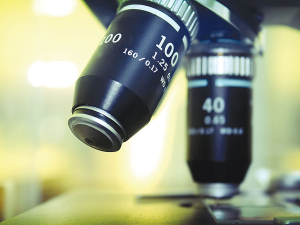Biosecurity NZ urges vigilance for yellow-legged hornets
Biosecurity New Zealand says Kiwis should continue to keep an eye out for yellow-legged hornets (Vespa velutina) over the holiday season.
 It is claimed that new rules mean Australia cannot currently export embryos or semen to New Zealand.
It is claimed that new rules mean Australia cannot currently export embryos or semen to New Zealand.
Recently updated import protocols means that imports of cattle genetic material into NZ from other countries has effectively come to a standstill.
Claims have been made that the new protocols, based on Biosecurity NZ's new Bovine Germplasm (embryos and semen) Import Health Standard, are unworkable. The new standard for bovine germplasm was issued on 25 August 2021 with new measures for managing Mycoplasma bovis and a number of other cattle diseases and came into effect on April 25 this year.
"A transition period of eight months has meant that industry and trading partners have been able to prepare for the changes, which provide protection to New Zealand from 15 bovine diseases," Biosecurity NZ says.
"New Zealand's import health standards are continually reviewed and amended to take into account changing biosecurity threats and trade requirements. If any New Zealand importers are unsure how to meet the new bovine germplasm IHS, they are encouraged to contact Biosecurity New Zealand for further guidance."
However, Amy Dickens from New South Wales-based cattle stud JAD Speckle Park, told Rural News that experienced embryo transfer technicians believe the new processing protocols will not produce viable embryos. She says the new rules mean Australia cannot currently export embryos or semen to New Zealand.
"This export market is now closed for Australia, but equally as unfortunate is that New Zealand breeders can no longer access genetics from Australis," Dickens adds. "In the meantime, cattle genetics cannot be imported into NZ, which will be a significant issue for NZ's beef and dairy cattle industries."
She claims that the new protocols require far more rigorous health testing and also a change to the way the embryos are processed.
"Experienced embryo transfer technicians are of the opinion that the new processing will not produce viable embryos," Dickens adds. "It could be a couple of years before things change to allow embryo exports from Australia to NZ."
Biosecurity NZ animal and plant health director Peter Thomson told Rural News that it had consulted extensively with industry and trading partner on the proposed measures and the scientific evidence that was considered while developing the measures. He adds that Biosecurity NZ has been negotiating during the transition period on how to implement the new export requirements with officials from Australia and other exporting countries. “Throughout this process, we made modifications to the proposed measures to ensure they were workable for all parties while still meeting our biosecurity requirements. The measures will provide appropriate biosecurity protection and are not intended to halt trade.”
Thomson says the antibiotic treatment measures for M. bovis in embryos follow international guidelines.
“Some submitters claimed that embryos will not remain viable following this treatment. However, these submitters did not provide any evidence to Biosecurity New Zealand to substantiate this claim.”
Thomson says there is not currently a validated test for M. bovis in embryos, as there is for semen, so treatment with antibiotics is currently the only option to meet NZ’s biosecurity requirements.
“Biosecurity New Zealand remains open to receiving and assessing any other options that sufficiently mitigate the risk of M. bovis in imported embryos.”
Dickens says while the semen protocols look like they will be workable in a shorter timeframe, it will require dialogue between MPI and its Australian equivalent government agency around how to interpret compliance of the new protocol.
“There have certainly been no conclusive negotiations with Australia to formulate new veterinary certificates and import permits,” she adds. “Therefore, zero knowledge about when importation of cattle genetics into NZ may resume.”
However, Thomson says MPI is currently very close to finalising a new veterinary certificate with the Australian Department of Agriculture, Water and the Environment (DAWE).
“We understand DAWE consulted with Australian germplasm exporters to ensure the measures are workable for them.”
He does concede that it is possible there may be a short delay with finalising this certificate.
“In the interim, Biosecurity New Zealand will assess any urgent bovine germplasm import requests on a case-bycase basis to reduce impacts to trade, while ensuring New Zealand is protected from biosecurity threats.”
The World Wide Sires National All Day Breeds Best Youth Camp Best All Rounder plaudit has become family affair, with 2026 Paramount Cup winner Holly Williams following in her sister Zara's footsteps.
DairyNZ is giving New Zealand farmers a unique opportunity to gain hands-on governance and leadership experience within the dairy sector.
Herd improvement company LIC has posted a 5.2% lift in half-year revenue, thanks to increasing demand for genetics.
According to the latest Fresh Produce Trend Report from United Fresh, 2026 will be a year where fruit and vegetables are shaped by cost pressures, rapid digital adoption, and a renewed focus on wellbeing at home.
The Roar is a highlight of the game hunting calendar in New Zealand, with thousands of hunters set to head for the hills to hunt male stags during March and April.
OPINION: The past few weeks have been tough on farms across the North Island: floods and storms have caused damage and disruption to families and businesses.

OPINION: Meanwhile, red blooded Northland politician Matua Shane Jones has provided one of the most telling quotes of the year…
OPINION: This old mutt has been around for a few years now and it seems these ‘once in 100-year’ weather…